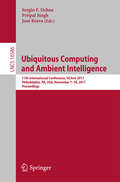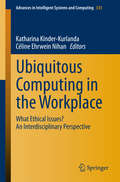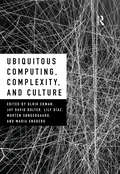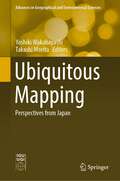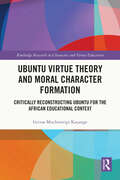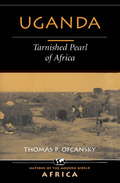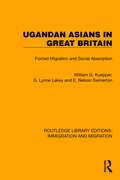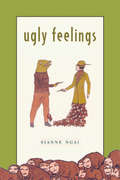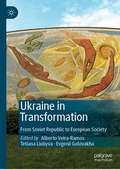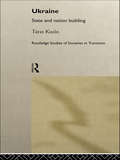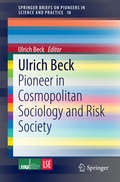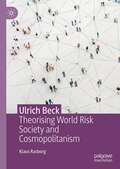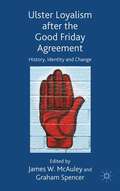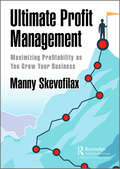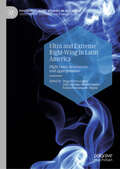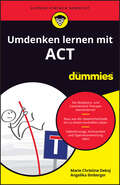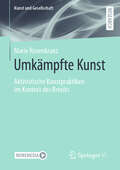- Table View
- List View
UX for Business: How to Design Valuable Digital Companies
by Joel MarshMany UX designers are surprised to learn that much of the job isn't about drawing things. It's about knowing what to draw and how to convince people to build it. Whether you're a one-person design team making products from scratch or a C-level product leader managing many products and strategies, UX for Business is your missing guide to real-world business design.You'll not only learn how to think about design as a professional but also discover how design can move the needle for your entire company. Author Joel Marsh helps you understand stakeholders, business models, the process of designing valuable solutions, dangerous choices that can ruin a product, and how to gain the attention your work deserves. You'll also explore the principles of designing common types of digital products and services, from portfolio sites to social networks to ecosystems.With this book, you'll learn:How to design the right things by understanding value, diagnostics, and probabilityHow to conduct UX research and analysis without the luxury of time or moneyThe most important aspects of common digital business modelsMethods for getting things done under less-than-ideal circumstancesHow to avoid common pitfalls caused by inexperience
Ubiquitous Computing and Ambient Intelligence
by Pritpal Singh José Bravo Sergio F. OchoaThis book constitutes the refereed conference proceedings of the 11th International Conference on Ubiquitous Computing and Ambient Intelligence, UCAmI 2017, held in Philadelphia, PA, USA in November 2017. The 60 revised full papers and 22 short papers presented were carefully reviewed and selected from 100 submissions. The papers are presented in six tracks and two special sessions. These are Ambient Assisted Living, Human-Computer Interaction, Ambient Intelligence for Health, Internet of Things and Smart Cities, Ad-hoc and Sensor Networks, Sustainability, Socio-Cognitive and Affective Computing, AmI-Systems and Machine Learning.
Ubiquitous Computing in the Workplace
by Katharina Kinder-Kurlanda Céline Ehrwein NihanThis book provides an interdisciplinary collection of views on the ethical challenges and opportunities of workplaces in the Internet of things. Current developments within Ubiquitous computing (ubicomp) systems designed for the workplace are introduced and philosophical, organizational and socio-ethical considerations of ubicomp in workplaces are provided. Suggestions regarding the rules that should be respected in order to favor an adequate implementation of ubicomp in the workplace are offered, considering both intra-organizational but also wider societal concerns. The interdisciplinary collection of contributions invites the reader to engage in the discussion of ubicomp in everyday working environments.
Ubiquitous Computing, Complexity and Culture
by Jay David Bolter Ulrik Ekman Lily Diaz Morten Sondergaard Maria EngbergThe ubiquitous nature of mobile and pervasive computing has begun to reshape and complicate our notions of space, time, and identity. In this collection, over thirty internationally recognized contributors reflect on ubiquitous computing’s implications for the ways in which we interact with our environments, experience time, and develop identities individually and socially. Interviews with working media artists lend further perspectives on these cultural transformations. Drawing on cultural theory, new media art studies, human-computer interaction theory, and software studies, this cutting-edge book critically unpacks the complex ubiquity-effects confronting us every day. The companion website can be found here: http://ubiquity.dk
Ubiquitous Mapping: Perspectives from Japan (Advances in Geographical and Environmental Sciences)
by Takashi Morita Yoshiki WakabayashiSince the last decades of the twentieth century, the circumstances surrounding map use and map making have drastically changed owing to advances in information and communication technologies (ICTs). In particular, the spread of web maps and mobile devices have altered the way people interact with maps. This book features the latest works on theoretical and practical issues of these changes by terming them “ubiquitous mapping”. In particular, the book pays attention to not only the technological basis but also multidisciplinary human–social aspects. The book covers the topics of the evaluation of ICT-based technologies for context-aware mapping, the theory and application of crowd-sourced geospatial information and collaborative mapping, and both the positive and negative effects of ubiquitous mapping on human society.
Ubiratan D’Ambrosio and Mathematics Education: Trajectory, Legacy and Future (Advances in Mathematics Education)
by Marcelo C. Borba Daniel C. OreyThis edited volume is written in memoriam of Professor Emeritus Ubiratan D’Ambrosio (1932 – 2021), who was a well-known Brazilian mathematics educator and historian of mathematics. This book explores the diverse facets of D’Ambrosio’s work as well as his legacy and the later adaptation of his ideas around the globe.It starts with a preface written by his son, Alexandre D' Ambrosio, who shares his personal experiences growing up with this father and his love for discovery. The book is then divided into four sections:Past and Future: Ubi’s Way of Seeing Education in the PresentRoots of EthnomathematicsEthnomathematics in ActionTrends in Ethnomathematics It features diverse points of view and experiences that explore mathematics and culture from researchers in the Americas, Africa, Europe and South Asia. Chapters range from personal explorations of D’Ambrosio’s impact to broader views of his research and work. This book forms part of the growing understanding of Ubiratan D’Ambrosio’s life, research, and the legacy he has left for millions of researchers, students and teachers worldwide. This book is appealing to anyone involved in mathematics education research as well as those interested in the history and future of mathematics education.
Ubuntu Virtue Theory and Moral Character Formation: Critically Reconstructing Ubuntu for the African Educational Context (Routledge Research in Character and Virtue Education)
by Grivas Muchineripi KayangeThis book investigates the ubuntu theory-based conception of virtue and moral character formation in the northern, western, and eastern regions of Africa, suggesting a critical reconstruction of ubuntu by conceptualising the four different forms of practices in moral character formation. Arguing for the critical reconstruction of ubuntu virtue theory as more nuanced than simply the standard ubuntu normative virtue theories (which give priority to the community as the sole locus for understanding virtues and character formation in Africa), the book builds a comprehensive model of virtue and moral character formation that draws insights from the reconstructed notion of ubuntu and other theories within and beyond the African thought. Chapters feature experience from across Africa including Malawi, Zambia, Zimbabwe, Uganda, Kenya, and South Africa, and centre on topics such as traditional cultural views and practices, political systems in various nations, neoliberalist thought, and primary, secondary and tertiary education systems in Africa and further afield. This is a valuable resource for scholars, academics, and postgraduate students, working in the fields of moral and values education, philosophy of education, and the theory of education more broadly. Those also interested in educational psychology may also find the volume of interest.
Uchalya (The Branded)
by Laxman Gaikwad P. A. KolharkarOn Bhamta or Ucalya, socially and economically handicapped people from Maharashtra; first person narrative of a member of the tribe.
Uganda
by Thomas P OfcanskyUganda, a landlocked nation in East Africa, was known during colonial times as the "Pearl of Africa," largely because of its pleasant climate and rich land. For most of the postindependence period, however, Uganda was one of the most brutal and violent nations in Africa. In 1986, a new government seized power, promising to restore internal stability and economic prosperity. Since then, Uganda has gradually become a model for other African states struggling to improve the lives of their citizens. In this broad survey, Thomas P. Ofcansky examines the political, economic, and social themes that have shaped Ugandan history. He inspects the impact of British colonial rule, investigates the emergence of the independence movement after World War II, and analyzes the factors that contributed to the collapse and decay of Ugandan society after Idi Amin's seizure of power in 1971. The author then explores the successes, failures, and prospects of Uganda's current government. In his conclusion, Ofcansky considers the difficulties facing a nation divided by ethnic, religious, and regional cleavages and argues that Ugandan leaders must work to establish a society in which all Ugandans benefit or face the possibility of a return to anarchy.
Ugandan Asians in Great Britain: Forced Migration and Social Absorption (Routledge Library Editions: Immigration and Migration #20)
by William G. Kuepper G. Lynne Lackey E. Nelson SwinertonUgandan Asians in Great Britain (1975) examines the impact of the 1972 immigration of 28,000 Asians expelled from Uganda, looking at the impact on both the immigrants themselves and the British host community. It is an attempt to understand some of the dynamics of forced migrant transition from one society and culture to another. The study was largely carried out in Wandsworth and Slough and shows how these communities – not without social problems before this influx of immigrants – adapted to the new arrivals. The sensitivity and effectiveness of the community relations organisations and the welfare agencies in these areas is revealed.
Ugly Feelings
by Sianne NgaiNgai mobilizes the aesthetics of ugly feelings to investigate not only ideological and representational dilemmas in literature--with a particular focus on those inflected by gender and race--but also blind spots in contemporary literary and cultural criticism.
Ukraine in Transformation: From Soviet Republic to European Society
by Alberto Veira-Ramos Tetiana Liubyva Evgenii GolovakhaThis edited collection provides a comprehensive overview of the major changes and transformations in Ukrainian society, from its independence in 1991, through to 2018. Based on solid empirical quantitative data generated by local institutions such as the monitoring survey Ukrainian Society, produced by the Institute of Sociology of National Academy of Sciences of Ukraine (IS NASU), the contributions explore transitions in values, occupational structure, education, inequality, religiosity, media, and identity, as well as the impact of the “Revolution of Dignity” (Euromaidan) and the Donbas conflict. Covering more than 25 years of Ukrainian history and complemented by qualitative research carried out by authors, Ukraine in Transformation will be invaluable to upper level students and researchers of sociology, political science, international relations and cultural studies, with a particular interest in post-Soviet Eastern Europe.
Ukraine: State and Nation Building (Routledge Studies of Societies in Transition #No.9)
by Taras KuzioUkraine: State and Nation Building explores the transformation of Soviet Ukraine into an independent state and examines the new elites and their role in the state building process, as well as other attributes of the modern nation-state such as borders, symbols, myths and national histories. Extensive primary sources and interviews with leading members of Ukranian elites, show that state building is an integral part of the transition process and cannot be divorced from democratization and the establishment of a market economy.
Ulrich Beck
by Ulrich BeckThis book presents Ulrich Beck, one of the world's leading sociologists and social thinkers, as a Pioneer in Cosmopolitan Sociology and Risk Society. His world risk society theory has been confirmed by recent disasters - events that have shaken modern society to the core, signaling the end of an era in which comprehensive insurance could keep us safe. Due to its own successes, modern society now faces failure: while in the past experiments were conducted in a lab, now the whole world is a test bed. Whether nuclear plants, genetically modified organisms, nanotechnology - if any of these experiments went wrong, the consequences would have a global impact and would be irreversible. Beck recommends ignoring the mathematical morality of expert opinions, which seek to identify the level of a given risk by calculating the probability of its occurrence. Instead, man's fear of collapse should offer an opportunity for international cooperation and a cosmopolitan turn in the social sciences.
Ulrich Beck: An Introduction to the Theory of Second Modernity and the Risk Society (Routledge Advances in Sociology)
by Allan Christiansen Mads SørensenSince the 1980s, Ulrich Beck has worked extensively on his theories of second modernity and the risk society. In Ulrich Beck, Mads P. Sørensen and Allan Christiansen provide an extensive and thorough introduction to the German sociologist’s collected works. The book covers his sociology of work, his theories of individualization, globalization and subpolitics, his world famous theory of the risk society and second modernity as well as his latest work on cosmopolitanism. Focusing on the theory outlined in Beck’s chief work, Risk Society, and on his theory of second modernity, Sørensen and Christiansen explain the sociologist’s ideas and writing in a clear and accessible way. Largely concerned with the last 25 years of Beck’s authorship, the book nevertheless takes a retrospective look at his works from the late seventies and early eighties, and reviews the critique that has been raised against Beck’s sociology through the years. Each chapter of Ulrich Beck comes with a list of suggested further reading, as well as explanations of core terms. The book also includes a biography of Beck, and full bibliographies of his work in both English and German. This comprehensive introduction will be of interest to all students of sociology, contemporary social theory, globalization theory, environmental studies, politics, geography and risk studies.
Ulrich Beck: Theorising World Risk Society and Cosmopolitanism
by Klaus RasborgThis book provides a comprehensive and thorough interpretation of Beck's theory of the (world) risk society, from its original formulation up to his sudden death on New Year's Day 2015. Beck's entire body of work is divided into four interrelated phases, which are successively presented and discussed, namely: the original theory of risk society (from 1986 onwards); the theory of the world risk society (from 1996 onwards); the theory of cosmopolitanism and cosmopolitanization (from 1996 onwards); and the theory of 'metamorphosis', 'emancipatory catastrophism and 'global imagined risk communities' (2013–16). The book thus demonstrates how Beck’s concept of the (world) risk society has given us a new language or a special lens that enables us to better understand contemporary society’s complexity and its myriad of human-made uncertainties in terms of climate change, terrorist threats, global pandemics, economic crises, and migration crises.
Ulster Loyalism after the Good Friday Agreement
by Graham Spencer James W. McauleyA timely assessment of loyalist history, identity and community in Northern Ireland today which provides a comprehensive picture of how loyalism has reacted to changes since the Good Friday Agreement. Challenging simplistic stereotypes of loyalism this book provides a complex multi-faceted explanation of the loyalist imagination.
Ultimate Fighting and Embodiment: Violence, Gender and Mixed Martial Arts (Routledge Research in Sport, Culture and Society)
by Dale C. SpencerMixed martial arts (MMA) is an emergent sport where competitors in a ring or cage utilize strikes (punches, kicks, elbows and knees) as well as submission techniques to defeat opponents. This book explores the carnal experience of fighting through a sensory ethnography of MMA, and how it transgresses the cultural scripts of masculinity in popular culture. Based on four years of participant observation in a local MMA club and in-depth interviews with amateur and professional MMA fighters, Spencer documents fighters' training regimes and the meanings they attach to participation in the sport. Drawing from the philosophical phenomenology of Martin Heidegger, Maurice Merleau-Ponty and Jean-Luc Nancy, this book develops bodies-centered ontological and epistemological grounding for this study. Guided by such a position, it places bodies at the center of analysis of MMA and elucidates the embodied experience of pain and injury, and the sense and rhythms of fighting.
Ultimate Profit Management: Maximizing Profitability as You Grow Your Business
by Manny SkevofilaxThroughout the author’s career as a banker and business consultant, he has seen many examples of businesses that were doing just “fine.” They were profitable and growing slowly but surely, but then, the business owner decided that it wasn’t enough anymore to simply grow slowly. What was suddenly needed was growth of 20%, 50%, or even 100% per year, just like the notable companies they see and hear about every day in the media. They began to try to grow the business and in a short period, a profitable and thriving business became unprofitable. Since the business was no longer profitable, it needed to take on debt to pay its expenses. After taking on more and more debt, the business reached a point where it could not find any more debt to take on. This circumstance caused the business to fail to pay its bills anymore which led to a financial day of reckoning.It doesn’t have to be this way. There is a more effective way to grow your business without causing it to become unprofitable. And that’s why the author wrote this book.Growing a business without making profits usually leads to a short lifespan for that business and there are exceptions such as Uber and DoorDash – but there is a big difference between a business that has outside investors (angel investors, private equity, and venture capital and the typical small business entrepreneur trying to bootstrap a business. The difference is that if a business has a huge target market and it is growing its sales rapidly, outside investors may be willing to fund losses for a period. The same does not apply to an entrepreneur trying to grow a business without outside investors. Losses show that a business is on borrowed time. Once your capital is exhausted, there is no going back. A business needs profits to remain viable and to be able to provide for its owners, its employees, and its community. Running a business that loses money will put you out of business.There is no reason not to be profitable as you grow your business! The author shares the lessons that were taught to him by leaders, mentors in business, and by his clients. What took him by surprise was that these lessons were not complicated. They’re simple. They use simple, uncomplicated methods to grow their businesses profitably. You will learn about the readily available tools you can use to ensure that your business does not turn unprofitable as you grow it. You’ll be convinced that it makes sense to resist the lure of the high-growth, no-profit strategy and instead embrace the approach of steady growth with profits.Use this book as a guide. In it, the author covers the most important aspects of reasonable, prudent growth that will avoid debt and allow you, your partners, and business associates a productive and non-stressful existence with a business that grows and profits correctly.
Ultra and Extreme Right-Wing in Latin America: Flight Lines, Resistances and Appropriation (Postdisciplinary Studies in Discourse)
by Diego Rivera López Jùlio Antonio Bonatti Santos Fabián Bustamante OlguínThis book examines the radicalisation of political discourse in Latin America, where historical grievances and media ecosystems shape social imaginaries and political practices. It is organised into four parts. Part I: Introduction sets the research context. Part II: Critical Apparatus provides the analytical foundation, addressing the theologisation of politics, hate discourses, and subjectivation processes. Part III: Case Studies offers detailed analyses of Argentina&’s libertarian populism and anti-statist narratives, Peru&’s far-right manipulation of historical memory and religious rhetoric, Chile&’s post-social uprising dynamics, marked by nationalist resurgence and institutional conservatism, and Brazil&’s denialism and media spectacle during the Bolsonaro era. Finally, Part IV: Epilogue reflects on the broader implications for discourse analysis and sociopolitical inquiry. This book dissects the linguistic mechanisms behind these phenomena and poses critical questions for further research. Its interdisciplinary approach will appeal to experts in sociology, political science, and discourse studies, fostering a deeper understanding of Latin America&’s complex sociopolitical landscape.
Umdenken lernen mit ACT für Dummies (Für Dummies)
by Marie Christine Dekoj Angelika IlmbergerRaus aus der Gewohnheitsfalle hin zu einem sinnhaften Leben Möchten Sie Ihrem Leben mehr Sinn geben und Ihren Werten entsprechend leben? Die Akzeptanz- und Commitment-Therapie kann Ihnen dabei helfen. Üben Sie sich in Akzeptanz, also Dinge und Gefühle anzunehmen, wie sie sind. Lernen Sie, der Gewohnheitsfalle zu entfliehen und anders mit Ihren Gedanken und Gefühlen umzugehen. Üben Sie sich in Achtsamkeit und dem Leben im Hier und Jetzt. Sorgen Sie durch Selbstmitgefühl und Selbstfürsorge dafür, dass es Ihnen gut geht. Und finden Sie heraus, welche Werte Ihnen im Leben wirklich wichtig sind und wie Sie sie mit engagiertem Handeln verfolgen können. Sie erfahren Wie Sie eine andere Perspektive auf sich selbst entwickeln Wie Sie Gewohnheiten ändern, die Ihnen nicht guttun Wie Sie mit dem ständigen Gedankenkarussel und Gefühlschaos umgehen
Umkämpfte Kunst: Aktivistische Kunstpraktiken im Kontext des Brexits (Kunst und Gesellschaft)
by Marie RosenkranzMarie Rosenkranz‘ Monografie ist in das expandierende Feld sozial- und kulturwissenschaftlicher Analysen der Kunst einzuordnen, die über eine immanent kunstwissenschaftliche Untersuchung von künstlerischen Werken hinausgehen. Das Kunstfeld ist in der Spätmoderne durch Phänomene geprägt, welche die Grenzen zwischen der Kunst und anderen gesellschaftlichen Zusammenhängen porös werden lassen. Häufig ist argumentiert worden, dass Versatzstücken aus dem Kunstfeld – etwa der kreativen Arbeit – eine Modellfunktion für die Gesellschaft zukomme. Marie Rosenkranz setzt hier auf originelle Weise anders an: Sie interessiert sich in ihrer kultursoziologisch ausgerichteten Monografie für das Phänomen des ‚Aktivismus‘ als soziale Praxis im Kunstfeld und damit für die Frage des zeitgenössischen Verhältnisses von Kunst und Politik. Rosenkranz argumentiert, dass dieser Aktivismus nicht zuletzt als Reaktion auf die Kulturalisierung der Politik zu verstehen ist: Indem die Politik zunehmend um kulturelle Fragen, z.B. von Identität, kreist, kann die Kunst auch in diesem Medium antworten. Doch was tun Künstler*innen, wenn sie aktivistisch tätig sind? Es ist diese Frage, die Rosenkranz im Kontext eines politischen Fallbeispiels verfolgt: dem Brexit-Referendum.
Umstrittene Säkularität: Religion, Nation und Sexualität in Georgien (Veröffentlichungen der Sektion Religionssoziologie der Deutschen Gesellschaft für Soziologie)
by Barbare JanelidzeFragen zur Beziehung von Religion und Politik, von Georgischer Orthodoxer Kirche und Nation sowie von Sexualität und LGBTQI*-Rechten werden im heutigen Georgien zu Arenen von Auseinandersetzungen und Konflikten zwischen verschiedenen gesellschaftlichen Gruppen. Einen Brennpunkt solcher Spannungen bildet der 17. Mai 2013, an dem eine von der LGBTQI*-Gemeinschaft organisierte Demonstration durch eine von Anhänger*innen und Klerikalen der Georgischen Orthodoxen Kirche angeführte große Menge von Gegendemonstrant* innen gewaltsam aufgelöst wurde. Das vorliegende Buch erforscht diese Kontroversen und Konflikte und baut dabei auf neueren interdisziplinären Forschungsperspektiven wie den Secular Studies und den Vielfältigen Säkularitäten. Zu diesem Zweck fokussiert die Autorin auf diejenigen Narrative von Nation, Modernität, Sexualität, Religion und Säkularität, die diese Auseinandersetzungen begleiten, und analysiert sie als zusammenhängende Fragen des Warum, Wie und Von-wem der Formationen von Säkularität in Georgien. Die Studie analysiert die wechselwirkende Formierung des Säkularen und des Religiösen auf drei Ebenen: Staat, Öffentlichkeit und das Selbst. Dabei arbeitet sie die gleichzeitige Partikularität und Universalität von Säkularität sowie ihre Verknüpfung mit universalisierten Wissensregimen heraus.
Umstrittene Wirklichkeiten der Sexarbeit: Eine Analyse von Wissenspolitiken in der Regulierung von Prostitution in Deutschland (Theorie und Praxis der Diskursforschung)
by Reiner Keller Lina Brink Marlen S. LöfflerDas wissenssoziologisch-diskursanalytisch ausgerichtete Buch fragt nach der diskursiven Konstruktion von Sexarbeit und deren Regulierung in Deutschland. Im Fokus stehen Arten und Weisen der Herstellung von Wissen in diesem Debattenfeld, dem immer wieder eine Unmöglichkeit von Evidenz („Dunkelfeld“), eine sehr ausgeprägte Dichotomie von Positionen jenseits etablierter Koalitionen und eine hohe Präsenz von Moral zugeschrieben wird. Die Studie verbindet diskursanalytische und problemsoziologische Perspektiven und untersucht vor diesem Hintergrund empirisch Wissenspolitiken und Wissensformen in der Verhandlung der Regulierung von Prostitution in Deutschland seit Mitte der 1980er Jahre. Einen zeitlichen Schwerpunkt bilden dabei Diskussionen und Prozesse rund um die Einführung des Prostituiertenschutzgesetzes im Jahre 2016. In den Blick genommen wird, wie die Faktizität von Sachlagen zum Phänomen Sexarbeit hergestellt, mit ethisch-moralischen Wertungen versehen und auf unterschiedlichen Ebenen in institutionell-organisatorische Bearbeitungen überführt wird – Prozesse, die durchgehend von Deutungskonflikten, Problematisierungs- und Entproblematisierungsstrategien begleitet werden. Als zentrale wissenspolitische Strategien werden dabei quer zu bestehenden Diskurskoalitionen Binarisierungen, Selbst-, Fremd- und Kontextverortungen sowie vorgenommene Grenzziehungen, eingebrachte Wissensformen und Versuche der Erzeugung von Resonanz näher betrachtet. Dies eröffnet aufschlussreiche Einsichten sowohl in die Komplexität der Aushandlungen wie auch in diejenige der verhandelten Wirklichkeits-Sachverhalte und vermeidet eine sozialwissenschaftliche Dopplung der im Untersuchungsfeld selbst bestehenden Diskursverhältnisse. Die Studie bietet zugleich eine Langzeitperspektive auf Verhandlungen zur staatlichen Regulierung von Prostitution in Deutschland und analysiert das diskursive Handeln politischer Akteur*innen auf verschiedenen Ebenen der politisch-administrativen Auseinandersetzung mit Sexarbeit und deren Regulierung: So werden sowohl die Bundespolitik als auch Landespolitiken und die umsetzende Ebene der Kommunen betrachtet. Empirische Grundlagen sind Dokumente aus der politisch-administrativen Bearbeitung der Regulierung von Prostitution, und Interviews mit zentralen Akteur*innen politischer Auseinandersetzungen um Sexarbeit und deren Regulierung. Das Buch richtet sich sowohl an Leser*innen, die an Diskursforschung interessiert sind als auch an solche, die sich für Sexarbeits- und Prostitutionsforschung interessieren.
Umstrittener Untergrund: Eine Fallstudie zu den gesellschaftlichen Auseinandersetzungen um Carbon Capture and Storage (2009-2012)
by Annabarbara FriedrichDie Autorin analysiert die gesellschaftlichen Auseinandersetzungen um den frühen Implementierungsversuch einer Carbon Dioxide Removal Technologie. Diese Maßnahmen sind vom Weltklimarat als ein Baustein zur Eindämmung des Klimawandels anerkannt. Die EU setzte eine solche Technologie, Carbon Capture and Storage (CCS), bereits im Jahr 2009 auf die politische Agenda der Mitgliedstaaten. Die Arbeit untersucht die restriktive Regulierung der Kohlendioxidabscheidung und –speicherung in Deutschland, die im journalistisch-öffentlichen Diskurs auch als gescheitert dargestellt wird. Statt die (fehlende) öffentliche Akzeptanz von CCS zu erklären, untersucht die Arbeit die gesellschaftliche Politisierung des Technologie-Sets. Auf der Grundlage von Theorieansätzen der Science and Technology Studies werden die Deutungsrahmen von Interessengruppen auf Bundesebene analysiert. Die Inhaltsanalyse, der öffentlichen Dokumente von Gesellschaftsakteuren im Kontext des Gesetzgebungsverfahrens (2009-2012), zeigt die Verknüpfung von Carbon Capture and Storage und bestehenden soziotechnischen Systemen sowie deren gesellschaftspolitische Kontexte. Die qualitative Analyse behandelt ein vergangenes Beispiel einer umstrittenen technologischen Intervention. Dies ist zugleich zukunftsweisend, da nachträgliche Methoden der CO2-Entnahme aktuell im Zusammenhang von sog. unvermeidbaren Restemissionen erneut diskutiert werden.

